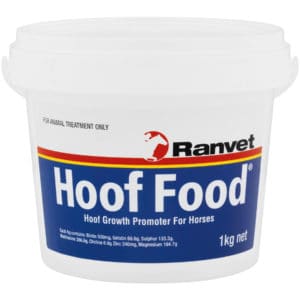Biotin Supplementation for Horses
Biotin is a B-group vitamin synthesized by microbes in the hindgut of horses. Almost all cell types take up biotin and convert it to carboxy biotin, a component of a wide range of diverse enzymes. Due to the activity of these enzymes, biotin is involved in fatty acid synthesis, gluconeogenesis, amino acid metabolism and other metabolic pathways. The vitamin is thought to also play a role in gene expression, cell proliferation and thus growth (NRC, 2012).
Biotin supplementation for horses may be beneficial in some horses with poor hoof quality. One reason for the advantageous effect is that biotin has a positive effect on the synthesis of intercellular glue (Josseck et al, 1995). Studies have shown that the equine hoof wall takes approximately 9-12 months to grow from the coronary band to the weight-bearing surface. Therefore, it is not surprising that research has also shown that biotin supplementation and effects in hoof improvement takes time. Biotin supplementation for horses on a daily basis is essential as Biotin is water soluble and is excreted from the horse’s system through sweat and urination.
The sole of the hoof contains more moisture than the outer wall providing a softer structure to deal with varying pressures and trauma from the ground (Kempson, 1987). All four feet are bearing the weight of our horse and if the integrity of the hoof is compromised, a number of issues may arise. It is important to note that a number of vitamins and minerals are required for sound hoof growth than just biotin.
Zinc is also added to rations to reduce lameness and improve the integrity of dairy and beef cattle hooves, which are exposed to quite severe conditions on farms and feedlots. Zinc is a trace mineral, which plays an important role in the growth and integrity of the hoof and is involved in over 500 enzymatic reactions. Inorganic zinc forms such as zinc oxide or zinc sulphate are poorly absorbed and have no significant effect on hoof growth. Extensive research has shown that chelated zinc bound to an amino acid significantly improves hoof integrity and reduces lameness as well as enhance immune function and reproduction (Josseck et al, 19955).
Some factors which an affect the rate of hoof growth are environment moisture, genetics, exercise and nutrition. Studies have shown a lack of energy, protein, vitamin and minerals can limit growth and a well-balanced ration will aid the growth of the hoof horn. Ranvet nutritionists can evaluate your horses diet to ensure sufficient energy, protein, vitamin and minerals are provided.
Ranvet’s Hoof Food is a hoof growth promoter for horses. It promotes stronger, healthier hoof and wall and reduced tender soles and dry, brittle soles. It supplies 7 key nutrients to improve hoof health, which include the daily requirement of Biotin and a combination of Zinc, Methionine, Sulphur, Choline, Magnesium and Gelatin for optimum hoof growth.
Download our latest Hoof Food newsletter here!
For more information on Hoof Food: https://www.ranvet.com.au/products/hoof-food/

Sources:
Josseck, H., Zenker, W., Geyer, H (1995). Hoof horn abnormalities in Lipizzaner horses and the effect of dietary biotin on macroscopic aspects of hoof horn quality. Journal of Equine Veterinarians. 27, 175-182.
Kempson, J (1987). Scanning electron microscope observations of hoof horn from horses with brittle feet. Journal of Veterinary Science. 120, 568-570.
Nutritional Research Council, Nutritional Requirement of Horses, Sixth Revised Edition, 2012
Experts in Equine Nutrition
Every product in the Ranvet range has been developed to meet a horse’s most specific need at any given time, be it in a training environment or on a breeding farm. Having pioneered the formulation of specific medications and dietary supplements for horses, the company is now recognised as a leader in the areas of equine health and nutrition.
